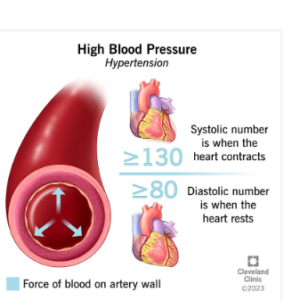The Truth About High Blood Pressure
High blood pressure, which can also be called hypertension, is one of those conditions which sadly affect a good percentage of the world’s population. Known as the silent killer, it may trigger serious medical ailments with no apparent symptoms. For preventing clinical deterioration such as a heart attack, stroke, or kidney failure, knowledge about high pressure possessing hypertension is very important. This is an in-depth article which will outline the facts about high blood pressure which include, it’s features, specialties, uses, main themes, and pros and cons of management strategies. By the end of this article, it is increasingly probable that you will have a better understanding of what high blood pressure is and the means to deal with it.

Features of The Truth About High Blood Pressure
Definition and Measurement
When describing hyper tension, It’s without a doubt hypertension that is characterized by the excessive force exerted by blood in the heart and blood vessels, which is categorized among the reasons for about one in eight deaths globally. As per the definition, high blood pressure refers to the abnormal and steady elevation in blood pressure in the arteries. Blood Pressure is a medical term used to calculate the force exercised on the blood vessels by moving blood within them in relation to time. In this regard the pressure is displayed in two numbers. 1) systolic, the pressure in the arteries during contraction called heartbeat, and 2) diastolic, the pressure in the arteries when the heart is at rest between heartbeats.
Hypertension, an illness where the blood volume pressure that a person has reached at rest is already high is also known as high blood pressure. Hypertension can be considered as a non-visible sickness because individuals may have this problem but do not notice it because they appear to be healthy on the outside. It is usually possible to ascertain whether a person has high blood pressure through blood pressure readings or through feeling certain symptoms that will arise once this high pressure reaches extreme levels. The average reading rate should always be in between 120/80 mmHg although there seems to be the following stages explaining Hypertension:
Stage one Hypertension: This stage can be explained mostly from a baby standpoint in that this stage showcases the reading from 130 to 139 diastolic or greater than or equal to 80 to 89 diastolic reading.
Stage two Hypertension: At this stage the force of the heart when this stage is observed is usually at its highest quite similar to stage one of hypertension as well. Higher than 140 systolic pressure rates have been deemed acceptable.
Hypertensive Crisis: Highest levels of hypertensive reading with the diastolic rate also higher than 120 has been set preventing it from getting through this dangerous stage.
These readings can create a lot of stress in the heart if the index moves towards Hypertensive reading increasing the levels of mortality globally. History is also conducive to showing that Hypertension can be genetically coded into a family from generation. If one looks through the lens of any given disease, several factors will eventually enable its development:
Genetics: If a family has a history of having biologically passed down hypertension from generation no matter how healthy the individual is when their time comes to an age above 30 they would develop this characteristic of overly high blood pressure.
Age: Logically understanding, the elder a person gets more prone to chances of hypertension occurring.
Eating Habits like Lifestyle: More intake of sodium, calcium and fluids like alcohol on a regular basis also persuade the individual to be exposed to hypertension. Not only this but also active persons seem to be getting lesser hypertension than stated.
Obesity: Not many people consider this a disease but this excess weight or bulging vices from surrounding areas become a disease making it fatal due to risk levels becoming high as well.
Stress: Long term stress causes the blood levels to go up even more than they generally are.
Headaches: Many people who suffer from high blood pressure have not experienced even a single symptom along those lines since the condition is not strong in them hence necessity for people to constantly check blood pressure is crucial. High pressure has origins from situations that include the following:
An individual may also incur the hidden sign of:
Nosebleeds
Flushing blood out from the hemoglobin circulation
Shortness of breath and many more.
Not directly indicative to hypertension however these symptoms may also be experienced during other health problems. That is why the word “Silent killer” has been created for drywall hypertension.
Specialty of the truth about high blood pressure | Kenya | Africa
The specialty of knowing high blood pressure entails looking at its prevention, diagnosis and treatment from more than one perspective. Hypertension can be roughly classified into two types:
Primary (Essential) Hypertension: Here is a type with no definable cause and usually takes time over the years to develop.
This accounts for approximately 90 to 95% of the cases.
Secondary Hypertension: hypertension caused by an underlying condition. This can include factors such as kidney disease, hormonal disorders or use of certain drugs. Unlike primary hypertension, it can emerge quickly and is likely to cause even more extreme blood pressure.
Diagnostic Tools
Various diagnostic measures are employed by healthcare providers to assist in establishing the presence and degree of hypertension:
Blood Pressure Monitor: Self measurement on a regular basis, either at home or within clinical settings.
Ambulatory Blood Pressure Monitoring: This involves a 24-hour period where a patient is monitored in order to attain a complete picture of the particular patient’s blood pressure variation.
Laboratory Tests: blood and urine checks which are aimed at establishing the causes of hypertension, if any.
Electrocardiogram (ECG): Tests aimed at determining the health of the heart.
Uses of The Truth About High Blood Pressure
One can hardly imagine owning a car and ignoring the engine on a cold winter day while starting it even on average days. That is how important understanding hypertension can be for effective management along with its prevention. Information gained can be employed in the following areas :
Preventive Measures
Familiarity with risk elements can help individuals take risks, including:
Changing Habits: Changes such as diet (the DASH diet), engaging in physical exercise, and attaining balance can help to reduce the blood pressure in individuals.
Checking You in the Regular Intervals Regular blood pressure measurement assists in early diagnosis and management.
Treatment as well as Control
Adequately managing the disease: For those patients who are hypertensive, comprehension of the complexities of the disease can enable them to manage it better.
Drugs: In the pharmacy today, we see a variety of drug classes like diuretics, ACE inhibitors, and beta-blockers for sale; each of the tablets serves its own purpose.
Change in lifestyle: A patient who is properly prescribed medical treatment can also enhance the intervention by practicing healthy choices.
Patient Compliance
Patients who have hypertension should be responsible and actively seek out the necessary information about the condition so that they can take action about it. In most cases, high blood pressure patients tend to overlook their condition which then results in further seeking treatment.
Main Theme of The Truth About High Blood Pressure
As in any other health issue or condition, high blood pressure should be accompanied by awareness which is to be supplemented with prevention and most importantly treatment as well. It encompasses the following:
Awareness: One of the best ways that help to empower an individual and assist them in controlling their health is through understanding the condition, the risk factors, and the implications particularly in regard to high blood pressure.
Prevention: With sufficient information, the likelihood of an individual developing hypertension can be minimized while the impacts of the condition can be effectively alleviated.
Treatment: There should be emphasis on having an understanding of the importance of seeking medical help and keeping up with treatment for those people who already suffer from hypertension.
Support and Resources: Where possible, patients should exploit available avenues including professionals, support systems, and literature to help improve on their well-being.
Pros and Cons of The Truth About High Blood Pressure.
Pros Cons
Early Detection: Regular monitoring can catch hypertension early. Lifestyle Changes Required: Significant lifestyle changes may be required.
Preventive measures: Knowing the risk factors does assist in making sure that there is a prevention. Medication Side Effects: This goes in line with side effects for blood pressure medication.
Improved Quality of Life: There is improvement regarding the health and the wellbeing once hypertension is well managed. Cost of Treatment: There are many people that live with the burden of treatment costs.
Increased Awareness: These comebacks make it easier to make healthier communities. Stigma: It is a fact that those suffering with high blood pressure are stigmatized.
Support Systems: The availability of community resources and support can be useful in management. Chronic Condition: Hypertension requires lifetime management
Conclusion: The positive side of high blood pressure
High blood pressure is a common illness but rather a serious concern that is always left to be addressed. There are many ways to manage hypertension, its symptoms, features, specialties, and uses if one knows about its implications. It is nothing new that looking after one’s own health with the help of early detection of some disease is always beneficial as it is the first and foremost step toward increased chances of prevention disease and happy management. There is a lot of detail about high blood pressure, causes about it, how one can manage it whether it’s eliminating bad habits, indulging in some good practice, getting timely medication, or even a routine checkup.
To the sufferers of hypertension, the message is there is a way out. Use everything you can get your hands on to assist you, be knowledgeable, and seek the aid of professionals who will guide you along the journey of blood pressure management.
The Expectations And The Truth About High Blood Pressure
What blood pressure is normal?
The normal blood pressure range is 120/80 mmHg, but anything lower or higher is considered either as prehypertension or hypertension respectively.
Does stress make high blood pressure?
Chronic stress is most definitely associated with an increase in blood pressure, and while it is temporary should not be neglected as it may lead to hypertension in the long run if not controlled.
How frequently can I monitor my blood pressure?
If a person is healthy and has normal pressure, they should have their blood pressure checked at least once in two years. However, this should be more frequent if the individual already has risk factors or hypertension.
What adverse effects can be expected from blood pressure lowering medications?
Dizziness, tiredness or fatigue, and headache may be some of the side effects. It is advisable to contact a healthcare provider regarding any issues.
Is high blood pressure curable?
Hypertension may not be completely reversible and is manageable in most cases, however, it can be controlled through lifestyle changes and pharmacological regimens. Maintenance is important when trying to attain healthy blood pressure levels.
